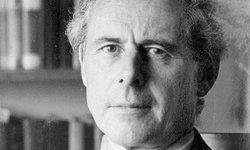Foot was born in London. His paternal grandfather had attained the rank of major general and his father, Richard, became a brigadier in the second world war before turning to a second career in business. Michael was a scholar at both Winchester college and New College, Oxford, returning to the latter after war service to complete his first degree and also earn a BLitt.
During the war he had served on Mountbatten's staff at the headquarters of Combined Operations before training as an officer in the SAS. Early in 1944 he was appointed intelligence officer in the SAS brigade. As he put it himself, "I have been shot at, have parachuted, have helped to plan raids, have taken part as observer in air operations and in a sea commando raid [and] have organised escapes."
In August 1944 he was flown into Brittany in a vain attempt to eliminate a notorious Gestapo officer. He was taken prisoner, resisted torture and managed to escape, only to be savagely beaten and left for dead by the French peasants in whose farm he and a comrade had tried to shelter. Recaptured, he was fortunate to be repatriated soon afterwards in exchange for a U-boat commander.
After graduating in 1947 Foot taught history and politics at Keble College, Oxford, for several years before entering the Cabinet Office as an official historian. He was appointed professor of modern history at Manchester University in 1967, but left after six years to become director of the European Discussion Centre. From 1975 onwards he was essentially an independent scholar and author.
Foot was a strikingly handsome man with intense intellectual energy and a remarkable fund of anecdotes and arcane information – imparted in a clipped, precise and almost lapidary style. He abhorred dullness and prolixity, and in seminars and conversation his ability to sparkle and stimulate ideas was unfailing. Following his father's advice he vowed never to retire and remained active, in research, writing and attending academic meetings until the final weeks of his life. He was awarded the French Croix de Guerre in 1945 and appointed CBE in 2001.
His idiosyncrasies, digressions and astringent opinions were evident in his popular survey Resistance: European Resistance to Nazism, 1940-45 (1976). Reviewers complained that his highly condensed style made for difficult reading, but also praised the book as a "noble and timely reminder of human nature at its most instinctive ... and least calculating".
Foot was born in London. His paternal grandfather had attained the rank of major general and his father, Richard, became a brigadier in the second world war before turning to a second career in business. Michael was a scholar at both Winchester college and New College, Oxford, returning to the latter after war service to complete his first degree and also earn a BLitt.
During the war he had served on Mountbatten's staff at the headquarters of Combined Operations before training as an officer in the SAS. Early in 1944 he was appointed intelligence officer in the SAS brigade. As he put it himself, "I have been shot at, have parachuted, have helped to plan raids, have taken part as observer in air operations and in a sea commando raid [and] have organised escapes."
In August 1944 he was flown into Brittany in a vain attempt to eliminate a notorious Gestapo officer. He was taken prisoner, resisted torture and managed to escape, only to be savagely beaten and left for dead by the French peasants in whose farm he and a comrade had tried to shelter. Recaptured, he was fortunate to be repatriated soon afterwards in exchange for a U-boat commander.
After graduating in 1947 Foot taught history and politics at Keble College, Oxford, for several years before entering the Cabinet Office as an official historian. He was appointed professor of modern history at Manchester University in 1967, but left after six years to become director of the European Discussion Centre. From 1975 onwards he was essentially an independent scholar and author.
Foot was a strikingly handsome man with intense intellectual energy and a remarkable fund of anecdotes and arcane information – imparted in a clipped, precise and almost lapidary style. He abhorred dullness and prolixity, and in seminars and conversation his ability to sparkle and stimulate ideas was unfailing. Following his father's advice he vowed never to retire and remained active, in research, writing and attending academic meetings until the final weeks of his life. He was awarded the French Croix de Guerre in 1945 and appointed CBE in 2001.
His idiosyncrasies, digressions and astringent opinions were evident in his popular survey Resistance: European Resistance to Nazism, 1940-45 (1976). Reviewers complained that his highly condensed style made for difficult reading, but also praised the book as a "noble and timely reminder of human nature at its most instinctive ... and least calculating".
Family Members
Sponsored by Ancestry
Advertisement
Records on Ancestry
Advertisement











